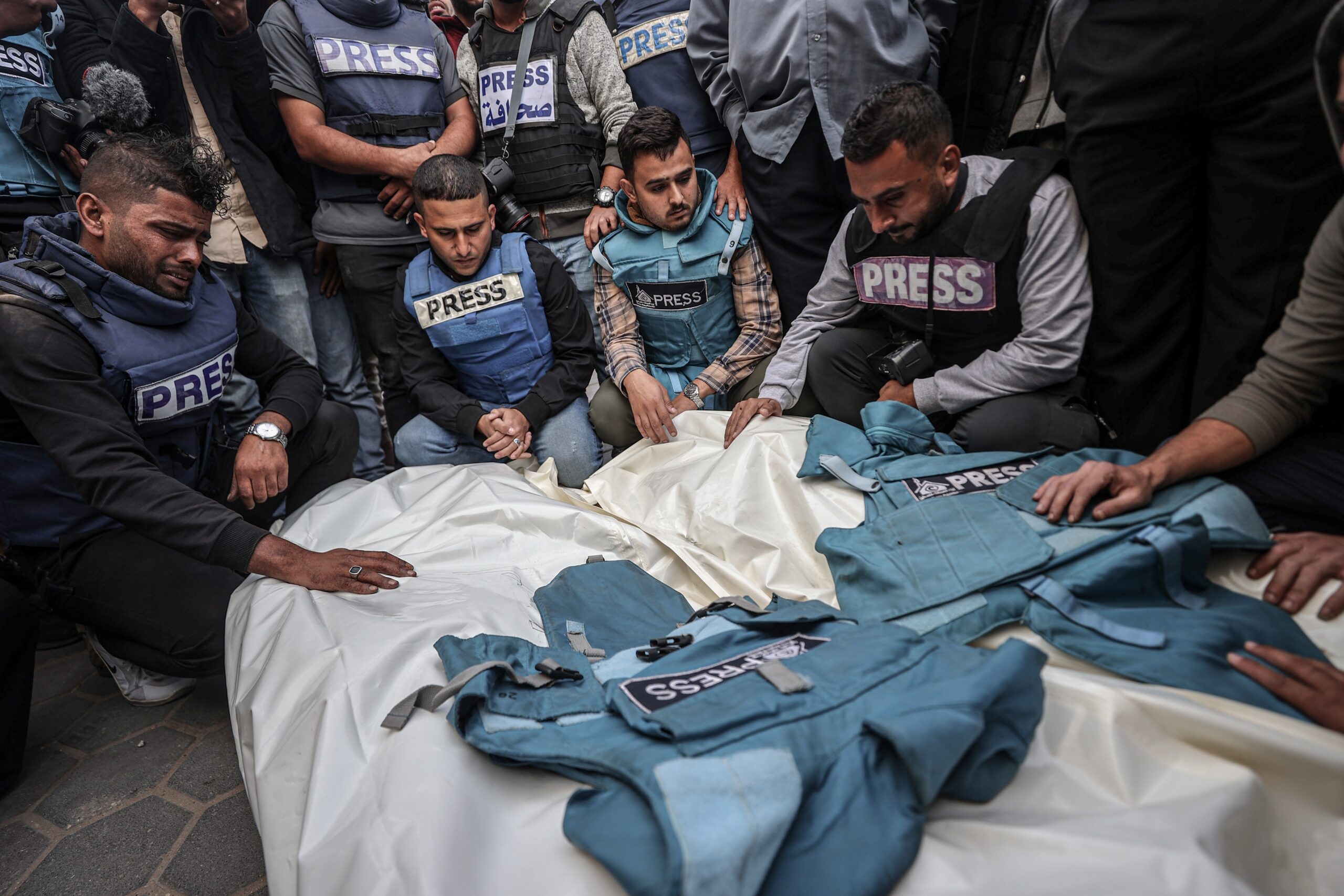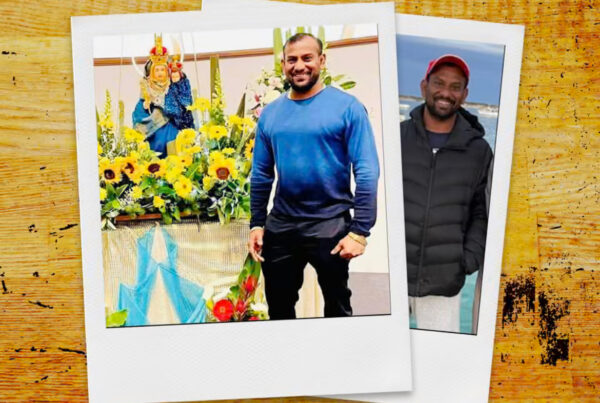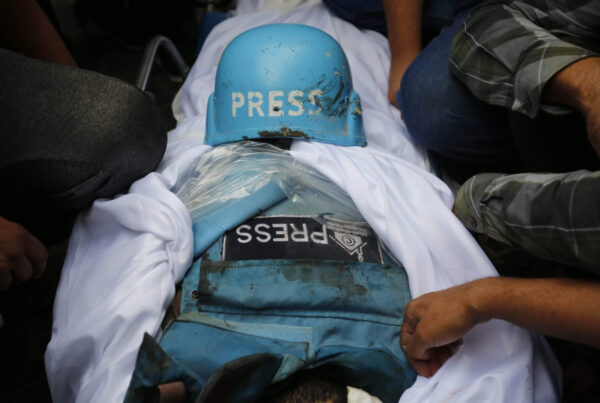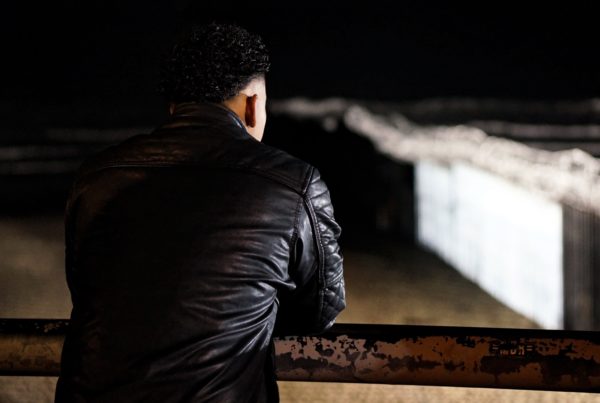Over the past year, Palestine has become the world’s most dangerous country for journalists, as media workers have increasingly been placed at risk of death, violence, imprisonment and displacement.
While international and local media’s access to Gaza is restricted, Palestinian journalists are continuing to document and tell the story of the violence.
However, Israel’s refusal to protect Palestinian media personnel and the patterns of targeting Palestinian journalists have made it increasingly dangerous to report on the conflict.
Consequently, a number of international organisations, including the United Nations, have alleged that Israel is committing war crimes in order to silence reportage on Gaza.
Zones of silence
Restrictions on media access, widespread damage and destruction of media infrastructure, and threats to journalists of physical attack and detention create what UNESCO calls ‘zones of silence’ which obstructs access to accurate information and allows misinformation and propaganda to flourish.
While international journalists and media outlets have access to the West Bank, which has enabled coverage of settler violence, what is happening in Gaza remains a difficult story to tell.
The only permitted media trips into Gaza have been via Israeli Defence Force (IDF)-controlled embeds where journalists selected by Israel travel with the military.
The Economist’s Editor-in-chief Zanny Minton Beddoes is one of the few journalists who have been allowed into Gaza. She told the 7am podcast that she was accompanied by a convoy of three Humvees, an armoured vehicle and the head spokesperson of the IDF, Rear Admiral Daniel Hagari.
It’s not uncommon in war zones for the military to restrict journalists from reporting on troop movements or weapons capabilities. However, the IDF-controlled embeds require that journalists agree to hand over some measure of editorial control to the IDF who review all such coverage before publication. This results in a tailored view of the conflict.
Deadliest country in the world for journalists
Since October 7 2023, Palestinian journalists have played an essential role in reporting on the violence in Gaza; however, significant dangers are hindering their ability to continue their work.
Preliminary investigations by the New York-based Committee to Protect Journalists (CPJ) have found it to be the deadliest conflict in the world for journalists since the CPJ began gathering data in 1992. As of 1 November 2024:
134 journalists and media workers were confirmed killed: 126 Palestinian, two Israeli, and six Lebanese
41 journalists were reported injured
2 journalists were reported missing
71 journalists were reported arrested
Of these, 43 journalists remain under arrest as of 1 November 2024. However, according to the CPJ’s offical assessment, the number of journalists behind bars may be higher than records show, as it has become increasingly difficult to verify information during the war.
At least 10 of the Palestinian journalists arrested by Israel are currently being held are under administrative detention, a policy that allows individuals to be detained without charge. Detention typically lasts six months but can be extended an unlimited number of times.
The Paris-based group Reporters Without Borders (RSF) reported that detained journalists are being subjected to ‘cruel, inhuman or degrading treatment’ including psychological and physical torture. During his 33-day detention, veteran Palestinian journalist Diaa Al-Kahlout was blindfolded the entire time, was physically and verbally assaulted, and forced to squat for extended periods. Al-Kahlout says that he is not capable of resuming his work due to the physical and mental effects of this torture
There has also been increased violence against journalists in Israel and the West Bank.
The CPJ is investigating almost 130 additional cases of potential killings, arrests and injuries.
The CPJ reports that families of journalists are also at risk of being targeted by Israel. After the Israeli Prime Minister’s office accused photojournalist Yasser Qudih of being an accomplice to the October 7th attack (a claim that has been rejected by major media outlets like Reuters), eight members of Qudih’s family were killed when their house in Gaza was struck by four Israeli missiles.
Reporting on the invasion is further hampered by widespread damage and violence, the displacement of 90% of Gaza’s population, the destruction of 80% of its buildings, disrupted communications, extensive power outages, famine and water shortages and damage to media infrastructure and offices. As reported in The Guardian, a survey of more than 200 journalists in Gaza by Arab Reporters for Investigative Journalism found that almost all respondents had been displaced and half were living in tents.
A sense of responsibility to report
In spite of the risks involved, Palestinians have continued to report on the violence from within Gaza.
Shahd Safi is a 23-year-old Palestinian journalist who until recently was reporting from Gaza where she was born and raised.
Safi says that Palestinian journalists feel a ‘responsibility’ to report the injustices that are being inflicted upon their people. Her journalism is a form of resistance, a way to reclaim power through her voice and resist dehumanising narratives about Palestinians. However, as the violence intensified, Safi found it increasingly difficult to file stories on Gaza.
After interviewing Palestinian detainees about their treatment by Israeli jailers (which involved sexual abuse), Safi was too traumatised to write the article.
“When I hear a Palestinian saying all of this, I imagine it happening to me.”
Safi continued reporting for seven months, as Israeli airstrikes laid waste to Gaza, killing members of her family, destroying their homes, leaving them homeless and facing severe shortages of food, water and medicine.
“Everyone’s house that I know is destroyed, all of our neighbourhoods, all of our memories, everything. Everything is destroyed,” Safi said.
In May 2024, fearing for their lives, Safi, her mother and three of her siblings fled their homeland and sought refuge in Egypt. The IDF’s ground invasion of Gaza was nearing their neighbourhood and Safi was concerned that her journalistic work had made her and her family targets. A
fter she fled the country, Safi stopped writing about Palestine. She no longer has direct access to stories about Gaza, but she is also processing grief, guilt and post-traumatic stress associated with leaving her home.
Are journalists being targeted?
Israeli Defence Force actions in Gaza raise concerns that they are trying to silence reporting on the conflict by targeting Palestinian journalists and their families.
The International Federation of Journalists, the Committee to Protect Journalists, and Human Rights Watch have each released reports documenting the deliberate targeting of journalists by the IDF. The CPJ has determined that at least five journalists were murdered by Israeli forces and it is investigating at least 10 other possible cases.
“In at least one case, a journalist was killed while clearly wearing press insignia in a location where no fighting was taking place. In at least two other cases, journalists reported receiving threats from Israeli officials and IDF officers before their family members were killed.”
In May 2023, five months before the most recent escalation in violence, the CPJ had already documented a ‘deadly pattern’ of Israeli forces killing journalists and evading responsibility for those deaths. One such story was that of Al Jazeera journalist and US citizen, Shareen Abu Akleh, who was shot in the neck between her helmet and her press jacket on 11 May 2022.
Shahd Safi believes that Palestinian journalists’ efficacy in reporting stories from Gaza has made them a target of the IDF.
“[The Israeli state is] actually very scared from journalism because they know it exposes how intense, how radical they have become.”
The IDF maintains that it does not deliberately target journalists, attributing the deaths of media workers to the intense bombardment of the territory.
However, an investigation by The Guardian and the Jordan-based non-profit, Arab Reporters for Investigative Journalism, identified that since 7 October roughly 30% of journalists who had been killed worked for media outlets affiliated with or closely tied to Hamas. At least 23 of them worked for the largest Hamas-run outlet in Gaza, al-Aqsa media network.
In response to questions relating to these findings, a senior IDF spokesperson described journalists working for al-Aqsa as ‘legitimate military targets’ and accused the outlet of employing ‘terrorists’ disguised as journalists. The IDF cited intelligence sources making it difficult to ascertain the veracity of these claims. The IDF has thus far resisted calls for more transparency relating to its rules of engagement with journalists.
According to Haggai Matar, executive director of +972 Magazine, the targeting of journalists in Gaza has created a “common understanding that if you’re a journalist, you bring death with you and that is not unhelpful for the Israeli cause of creating doubt and fright to do the work.”
War crimes investigations
In February 2024, U.N. experts condemned the targeting of journalists in Gaza, stating that ‘killings, injury, and detention are a deliberate strategy by Israeli forces to obstruct the media and silence critical reporting.’
In the Additional Protocol I to the Geneva Conventions (1977), under Articles 79.2 and 51.3, journalists are considered as civilians and are protected by international humanitarian law provided that they do not play a direct part in hostilities.
Article 1.4 of the Additional Protocol 1 extends protection of civilian victims to include ‘armed conflicts in which peoples are fighting against colonial domination and alien occupation and against racist regimes in the exercise of their right of self- determination.’
174 States have ratified Protocol 1 but Israel is not a signatory.
PEN International President, Burhan Sonmez, denounced as ‘war crimes’ the deliberate targeting of journalists, and indiscriminate attacks that kill or injure journalists. Sonmez continues, “All those responsible must be held to account. Protecting press freedom and ensuring the safety of journalists is fundamental during times of war and essential in providing the public with accurate and timely information.”
Accountability for any such potential crimes may not be pursued domestically – Israel has never put a soldier on trial for an intentional or unintentional killing of a journalist.
However, in May 2024, the International Criminal Court prosecutor, Karim Khan, filed applications for arrest warrants for Hamas and Israeli leaders – including the Prime Minister, Benjamin Netanyahu, and his defence minister, Yoav Gallant – on charges of crimes against humanity and war crimes.
The eradication of journalism in Gaza
Israeli restrictions on media access to Gaza have hampered reporting on the invasion of Gaza and forced dependence on Palestinian journalists and sources. With this in mind, RSF has warned that Israel’s refusal to protect media personnel is going to eradicate journalism in the Gaza Strip.
While this is a highly nuanced and complicated issue that demands in depth analysis, independent press freedom organisations like the IFJ, CPJ, and RSF are all in agreement that IDF actions against journalists are deliberate attempts to suppress reporting from Gaza.
Jodie Ginsberg, the chief executive of the CPJ, stated of Israel’s actions that: “… [with] the high rate of journalists’ deaths and arrests, including a slew in the West Bank; laws allowing its government to shut down foreign news outlets deemed a security risk, which the prime minister has explicitly threatened to use against Al Jazeera; and its refusal to permit foreign journalists independent access to Gaza all speak to a leadership that is deliberately restricting press freedom… That is the hallmark of a dictatorship, not a democracy.”
When the Israeli state threatens, detains and kills Palestinian media workers and their family members, they prevent the world from connecting with the suffering and destruction in Gaza. Once the journalists in Gaza have been silenced, there will be no-one left to hold the Israeli state to account.
This article was first published in the November 2024 edition of the PEN Sydney magazine.



